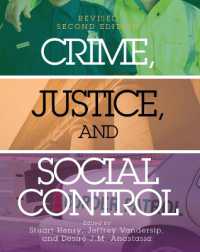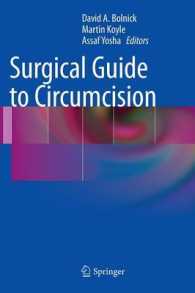- ホーム
- > 洋書
- > 英文書
- > History / World
Full Description
This collection of chapters explores how history is created, shared, and contested in urban and marginalized spaces by examining memory, displacement, resilience, and community-driven historical interventions across Mexico.
Bridging academic research with lived experiences, the book shows how public history is a powerful tool that both reflects on the past and projects more egalitarian futures of justice, representation, and cultural affirmation. Centred mainly around Mexico City, but also touching on the impact of migration at the northern border, it contributes to the debates around new forms of history construction and covers topics including territorial dispossession, deportation processes, the violence entailed in erased histories, and the reconfiguration of daily life during the COVID pandemic. Through diverse approaches and methodologies such as documentary film, digital storytelling, public art, museum interpretations, grassroots activism, and other collective or community work, it provides readers with valuable insights into how historical narratives shape identities, social movements, and public policies, as well as a deeper understanding of how communities engage with their past to reclaim space, resist erasure, and foster belonging.
This book is a useful resource for all upper-level undergraduates, postgraduates, and scholars interested in urban history, public history, cultural studies, anthropology, and Latin American studies.
Contents
Introduction Memories of the Urban 1. Public History in the Making. The Pueblos Originarios of Mexico City: Memory, Territory, and Legal Status 2. Memories of the Urban Past: The Experience of Metropolitan Histories 3. Stories of El Parián: Public History as an Organizing Tool in Urban Community-Based Processes Periphery and Erasure 4. Memory, Trauma, and Resilience: Stories of the 19S Earthquake 5. Periferia gráfica 6. Creating Memory and the Reimagining of the Edge of Tenochtitlan Exclusion Beyond Mexico City 7. The Self-Taught Border Art of the Deported: Luis Sotero 8. Humanizing Deportation: An Archive of Migrant Knowledge 9. Unveiling Feminist Cartography in Yucatan: From the First Feminist Congress of 1916 to the First Women to Hold Elected Office in 1923 Re-Placing the Museum 10. Relic, Connection, Loss: Public History and Community Narratives in Mexico 11. From Praxis to Production: The Symbolic Displacements of Linguistic Patrimony in Mexico's Nineteenth Century 12. A Community Museum in the City: Heritage and Public Uses of the Past in Valle de Chalco Solidaridad Intimate Spaces 13. Between Joy and Frailty: Minimal Stories of Dwelling in Mexico City 14. The Invisibles of the Arts: Stories of Performance Artists from Confinement 15. Stuck at Home: A Comic on Covid-19








